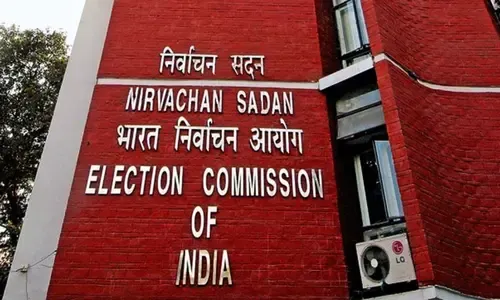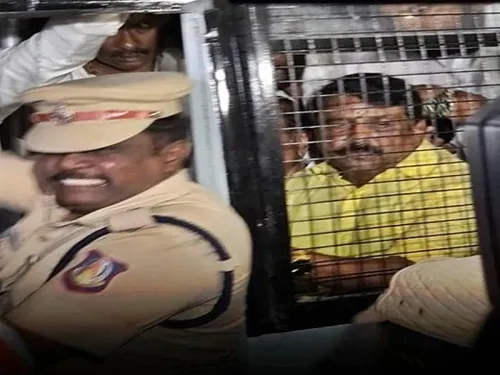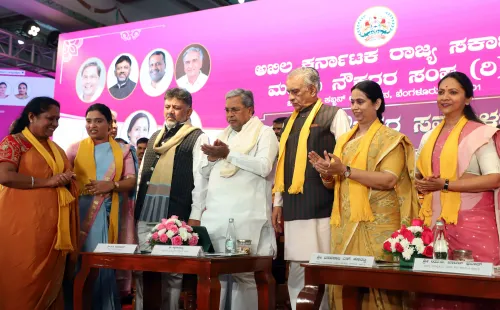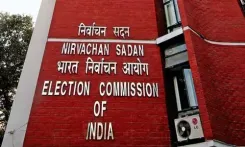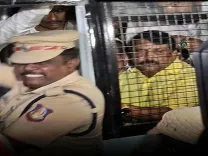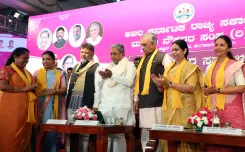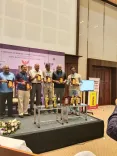Is There a CBI Probe into the Kaleshwaram Project?
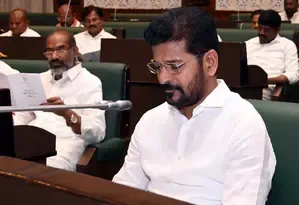
Synopsis
Key Takeaways
- The Telangana government has transferred the Kaleshwaram project investigation to the CBI.
- Serious allegations of corruption involving Rs 1 lakh crore have surfaced.
- The Ghose Commission report has found significant irregularities in the project’s execution.
- The debate over the project has intensified political tensions between parties.
- Public accountability in infrastructure projects is being called into question.
Hyderabad, September 1 (NationPress) - On Monday, the government of Telangana made a significant decision to transfer the investigation concerning alleged mismanagement in the Kaleshwaram Lift Irrigation Project to the Central Bureau of Investigation (CBI). This announcement was made by Telangana Chief Minister A. Revanth Reddy in the Assembly during the early hours of Monday following an extensive debate that had commenced at 4 p.m. on Sunday.
The Chief Minister articulated that the complexity of the case, which involves inter-state issues and certain Central agencies, necessitated the intervention of the CBI. He revealed this pivotal information around 1:40 a.m. after a lengthy discussion, lasting nearly 10 hours, regarding the findings of the P.C. Ghose Commission. This Commission investigated the alleged discrepancies during the construction of the Kaleshwaram project under the Bharat Rashtra Samithi (BRS) government.
Revanth Reddy accused the former Chief Minister K. Chandrasekhar Rao (KCR) and former Irrigation Minister T. Harish Rao of misappropriating public funds amounting to Rs 1 lakh crore, while the former Finance Minister Eatala Rajender remained complicit through silence. He further stated that the Commission also criticized numerous officials, including IAS officers and engineers.
The Chief Minister condemned KCR's actions, claiming he effectively signed a 'death warrant' for Telangana through the Kaleshwaram project, which incurred a debt of Rs 87,000 crore at an interest rate of 11.50%. Reddy disclosed that his government has thus far repaid approximately Rs 49,835 crore in principal and interest, yet an estimated Rs 47,000 crore remains needed to finalize the project.
The report presented in the Assembly on Sunday found KCR directly and indirectly responsible for the infractions related to the planning, execution, operation, and maintenance of three barrages. The debate was marked by heated confrontations between members of the ruling Congress party and the main opposition BRS, with BRS members protesting by tearing copies of the report and subsequently walking out.
After leaving the Assembly, BRS leaders including K.T. Rama Rao and Harish Rao disposed of the report's copies in a trash bin. In response to inquiries from AIMIM floor leader Akbaruddin Owaisi, the Chief Minister asserted that the government had fully cooperated with the Commission.
Previously, Reddy had charged that KCR altered the Kaleshwaram project design, inflating its costs to amass wealth comparable to that of the last Nizam of Hyderabad, recognized as the world's richest man of his era. He criticized both KCR and Harish Rao for shifting the project location and accused them of misusing funds allocated for the project.
Led by former Supreme Court Justice Pinaki Chandra Ghose, the Commission scrutinized the planning, design, construction, quality control, operation, and maintenance issues concerning the Medigadda, Annaram, and Sundilla Barrages within the Kaleshwaram framework.
In reaction to Harish Rao's comments during the debate, the Chief Minister claimed that he was misleading the public with incomplete data. Reddy stated that the BRS government intentionally concealed facts to justify the relocation of the project. He noted that the Ghose Commission's findings exposed their actions, prompting BRS leaders to lash out against it. The report clearly indicated on page 98 that Harish Rao had committed significant errors.
Reddy emphasized that the Maharashtra government never opposed the project at Tummidihatti; they merely suggested lowering its height. He pointed out that KCR and Harish Rao disregarded the retired engineers' committee's recommendations in favor of relocating the barrage from Tummidihatti to Medigadda.
According to the Ghose Commission, the state treasury was exploited by neglecting the retired engineers' committee's findings. Deputy Chief Minister Mallu Bhatti Vikramarka stated that the project, which cost Rs 1 lakh crore, collapsed within three years, alleging that the costs were inflated for personal gain.
He compared the Kaleshwaram project's failures with older projects that have remained intact for decades, citing the Pocharam project constructed by the Nizam that successfully withstood recent floods. Vikramarka pointed out that the Medigadda barrage failed while BRS was in power and emphasized that the Ghose Commission's report was generated after hearing from KCR and Harish Rao. He criticized that a project should be engineered by subject matter experts, not politicians, suggesting that KCR and Harish Rao were responsible for the Kaleshwaram design.
Irrigation Minister Uttam Kumar Reddy stated that the previous BRS government expended over Rs 1 lakh crore on Kaleshwaram, labeling it a man-made financial catastrophe for India. He argued that Telangana could have completed the earlier Pranahita-Chevella project for Rs 38,500 crore, ensuring extensive irrigation in North Telangana without the exorbitant hydropower costs associated with Kaleshwaram.
Uttam Kumar Reddy added that by 2014, a third of the Pranahita-Chevella project was already executed, with statutory processes largely in place. Continuing with that plan would have provided reliable irrigation without the complications introduced by Kaleshwaram. He reiterated that the previous Congress government initiated Pranahita-Chevella in 2009 with Central Water Commission oversight, and significant efforts for interstate agreements were underway when the TRS government abandoned it in favor of a redesign that led to Kaleshwaram.
The Kaleshwaram project was sanctioned with an initial budget of approximately Rs 87,449 crore, but later costs escalated, with the CAG reporting figures around Rs 1.27 lakh crore, and projections now suggest it could reach about Rs 1.47 lakh crore, contrasting sharply with the lower-cost Pranahita-Chevella option.
BJP floor leader A. Maheshwar Reddy expressed concern over the omission of KCR's corruption in the report, claiming it raised doubts about its credibility. He insinuated that the report seemed to be a collaborative effort between Congress and BRS.
Reddy questioned what actions the government would take against corruption.


